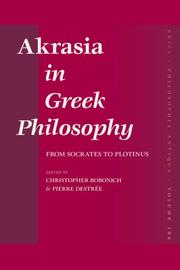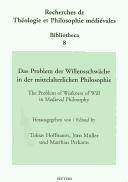| Listing 1 - 10 of 21 | << page >> |
Sort by
|
Book
ISBN: 0824031857 Year: 1990 Publisher: New York (N.Y.): Garland
Abstract | Keywords | Export | Availability | Bookmark
 Loading...
Loading...Choose an application
- Reference Manager
- EndNote
- RefWorks (Direct export to RefWorks)
Akrasia --- Aristotle.
Book
ISBN: 1859726925 Year: 1997 Publisher: Aldershot Ashgate
Abstract | Keywords | Export | Availability | Bookmark
 Loading...
Loading...Choose an application
- Reference Manager
- EndNote
- RefWorks (Direct export to RefWorks)
Book
ISBN: 0195043219 Year: 1987 Publisher: New York (N.Y.): Oxford university press
Abstract | Keywords | Export | Availability | Bookmark
 Loading...
Loading...Choose an application
- Reference Manager
- EndNote
- RefWorks (Direct export to RefWorks)
Act (Philosophy) --- Akrasia --- Irrationalism (Philosophy) --- Self-control --- Self-deception

ISBN: 8878390771 9788878390775 Year: 2006 Volume: 300 21 Publisher: Roma Pontificia Università Gregoriana
Abstract | Keywords | Export | Availability | Bookmark
 Loading...
Loading...Choose an application
- Reference Manager
- EndNote
- RefWorks (Direct export to RefWorks)
Self-deception. --- Akrasia. --- Akrasia --- Self-deception --- Acrasia (Ethics) --- Incontinence (Ethics) --- Deception --- Defense mechanisms (Psychology) --- Self-perception --- Ethics

ISSN: 00791687 ISBN: 9004156704 9789004156708 9786612396960 128239696X 9047420128 9789047420125 Year: 2007 Volume: 106 Publisher: Leiden Brill
Abstract | Keywords | Export | Availability | Bookmark
 Loading...
Loading...Choose an application
- Reference Manager
- EndNote
- RefWorks (Direct export to RefWorks)
Discussions on akrasia (lack of control, or weakness of will) in Greek philosophy have been particularily vivid and intense for the past two decades. Standard stories that presented Socrates as the philosopher who simply denied the phenomenon, and Plato and Aristotle as rehabilitating it straightforwardly against Socrates, have been challenged in many different ways. Building on those challenges, this collective provides new, and in some cases opposed ways of reading well-known as well as more neglected texts. Its 13 contributions, written by experts in the field, cover the whole history of Greek ethics, from Socrates to Plotinus, through Plato, Aristotle, and the Stoics (Cleanthes, Chrysippus, Epictetus).
Akrasia --- Philosophy, Ancient. --- History. --- Akrasia. --- Ethics --- Wilszwakte. --- History --- Ethics, Ancient. --- Morale ancienne --- Histoire --- Philosophy, Ancient --- Ancient philosophy --- Greek philosophy --- Philosophy, Greek --- Philosophy, Roman --- Roman philosophy --- Ethics, Greek --- Acrasia (Ethics) --- Incontinence (Ethics) --- Akrasia - Greece - History.
Book
ISBN: 9780199896134 Year: 2012 Publisher: Oxford Oxford University Press
Abstract | Keywords | Export | Availability | Bookmark
 Loading...
Loading...Choose an application
- Reference Manager
- EndNote
- RefWorks (Direct export to RefWorks)
Akrasia --- Acrasia (Ethics) --- Incontinence (Ethics) --- Ethics --- Political philosophy. Social philosophy --- Philosophical anthropology
Book
ISBN: 946166026X 9789461660268 9058677524 9789058677525 9789058677525 Year: 2009 Publisher: Leuven, Belgium Leuven University Press
Abstract | Keywords | Export | Availability | Bookmark
 Loading...
Loading...Choose an application
- Reference Manager
- EndNote
- RefWorks (Direct export to RefWorks)
'Weakness of the will' is often used as a shorthand expression to describe a situation in which a person acts against his/her better judgement. This well-known phenomenon poses a serious philosophical problem because it questions deeply our self-understanding as rational agents. This volume offers the first comprehensive investigation into the roots of the present discussion of this subject. Four principal areas constitute the basic framework of the history of this problem: (1) the debate on akrasia in classical Greece; (2) the Christian understanding of weakness of will in late Antiquity; (3)
Will. --- Ethics, Ancient. --- Ethics, Medieval. --- Akrasia --- History --- Will --- Ethics, Ancient --- Ethics, Medieval --- Philosophy, Medieval. --- Philosophy --- History.
Book
ISBN: 0199866899 1283115980 9786613115980 0199712328 9780199866892 Year: 2009 Publisher: Oxford ; New York : Oxford University Press,
Abstract | Keywords | Export | Availability | Bookmark
 Loading...
Loading...Choose an application
- Reference Manager
- EndNote
- RefWorks (Direct export to RefWorks)
This is a study of legal interference with individual preferences and will canvass the interdisciplinary literature in economics, psychology, philosophy, and law. It discusses the particular conditions necessary for the state to legally interfere with our freedom of choice.
Paternalism. --- Akrasia. --- Perfectionism (Personality trait) --- Personality --- Acrasia (Ethics) --- Incontinence (Ethics) --- Ethics --- Parentalism --- Social classes --- Social control --- Social systems
Book
ISBN: 9789058677525 9058677524 Year: 2009 Volume: 40 Publisher: Leuven Leuven University Press
Abstract | Keywords | Export | Availability | Bookmark
 Loading...
Loading...Choose an application
- Reference Manager
- EndNote
- RefWorks (Direct export to RefWorks)
Academic collection --- Philosophy, Ancient --- Philosophy, Medieval --- Will --- Philosophie ancienne --- Philosophie médiévale --- Volonté --- Classical and mediaeval philosophy --- History --- Akrasia --- To 1500

ISBN: 9042917792 9789042917798 Year: 2006 Volume: 8 Publisher: Leuven Paris Dudley Peeters
Abstract | Keywords | Export | Availability | Bookmark
 Loading...
Loading...Choose an application
- Reference Manager
- EndNote
- RefWorks (Direct export to RefWorks)
German, English, and French.
Filosofie van de Middeleeuwen --- Philosophie du Moyen Age --- Theologie --- Théologie --- Akrasia --- Ethics, Medieval --- Acrasie --- Morale médiévale --- History --- Congresses. --- Histoire --- Congrès --- Morale médiévale --- Congrès --- Medieval ethics --- Acrasia (Ethics) --- Incontinence (Ethics) --- Ethics --- Akrasia - History - To 1500 - Congresses. --- Ethics, Medieval - Congresses.
| Listing 1 - 10 of 21 | << page >> |
Sort by
|

 Search
Search Feedback
Feedback About UniCat
About UniCat  Help
Help News
News